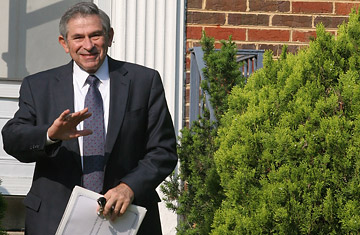
Embattled World Bank President Paul Wolfowitz leaves his house in the Washington
How come? Because if the tarnished holdout waits long enough, and defies every reasonable expectation that he should go, there comes a time when simply leaving becomes the greatest chit he has to play in a final deal. And you can get a lot when you trade in that last chit.
That's what happened this week with Wolfowitz. He profited by holding out — and fighting — even after everyone knew he was a goner. He held out so he could hold his head up.
That's probably not what he was thinking six weeks ago when his long goodbye began. At first he denied any wrongdoing in helping arrange a cushy promotion for his sweetheart, a former World Bank employee. Then he waited stoically through the investigation phase, when it only gradually became clear his days were dwindling down. He entered the final week fighting, and even after the White House removed Wolfowitz from life support a few days ago, he doubled down with a vow to soldier on. From a distance, it might have seemed heroic. But much of it was psy-war for the climactic round.
Wolfowitz and his lawyers prevailed on their terms — he received a qualified statement of support about whether he had violated conflict-of-interest rules when he intervened on behalf of Shaha Ali Riza, his girlfriend. The Board noted Wolfowitz's assurances that he had performed in good faith. The Board said it would "accept" those assurances, a remarkable outcome considering the circumstances. And so Wolfowitz, satisfied that his name and honor were still intact, tendered his resignation, effective at the end of June. He had to go; he had become a distraction.
Wolfowitz always enjoyed an advantage at the table: he knew who he was — and wasn't — up against and he exploited the weaknesses of the board's polyglot membership adroitly. He knew the board would have trouble reaching a consensus about his fate; he knew that its members were divided internally; he probably also figured that they were reluctant to take firm action knowing such a move could trigger other investigations into small-stroke favoritism inside the largely oversight-free World Bank.
So what does the departure of a man who worked in just about every Administration since the Nixon era really mean? Probably not much in the long run. The intellectual architect of the Iraq war exits the stage for now, taken out not by his massive miscalculations as a geo-strategist but by his efforts to help his girlfriend. An international bureaucracy's murky rules governing favoritism remain as shrouded as ever in mystery. And we get a lesson in how to do a lot with a little: how to dicker for a shred of honor when you have not much left to lose but your job and your title.
